Sara Rivenes Lafontan from UiO and the Norwegian Research School of Global Health writes about her learnings from a qualitative course at the University of Copenhagen.
Sara Rivenes Lafontan is a PhD student at the University of Oslo. Her PhD project is about adaptation of new technology among birth attendants and laboring women in Tanzania. She recently published a scientific article about laboring women´s experience using a newly developed electronic fetal heart rate monitor.
“You are you?” asked the professor. I sat there puzzled by the question. “I am Sara” I thought, “a researcher, a colleague, a friend, a…” But that was not the answer the professor was looking for. What was my epistemological position? Was I a constructionist believing that everything is relative and that there are several realities all socially constructed? Or perhaps a positivist certain that the reality is static and directly measurable? During the course I have attended for the past two weeks titled “Advanced course in qualitative research in global public health” we as participants have been challenged to position ourselves within these theories. The course is organized in collaboration between the University of Copenhagen, the University of Bergen and the Norwegian Research School of Public Health. During the course we have learned that epistemology is the underlying assumption or belief about how knowledge is generated. Ontology is the study of the nature of being, becoming, or reality. It is grounded in the philosophical idea that everything around us is subjective and based on our individual reality. We have also learnt that as a qualitative researcher it is important to be transparent to our readers about who we are as researchers; our epistemological position and the theoretical approach we use to collect and analyze data. “But wait a minute” I thought “aren’t we as researchers supposed to generate some sort of objective truth completely separated from who we are as human beings and what we believe in?”
Later on in the course, during a group exercise about qualitative thematic analysis, participants were separated into groups at random and instructed to extract key features of a text and condense it into key words, a process called coding. These codes would eventually be developed into interpretative themes that would be presented to the class by each group at the end of the exercise. The text was about health-seeking behaviors of HIV positive men in Zimbabwe. Course participants were from multiple professional backgrounds such as medicine, anthropology and philosophy and came from various corners of the globe. Therefore, the multidisciplinary environment permitted rich discussions and interpretations from diverse perspectives. When each group presented their interpretative themes that they felt summed up the most important aspects of the text, it turned out we had all focused on different aspects of the text. The health professional had focused on issues such as adherence- the men´s ability to follow the treatment regimen, while the anthropologist had spent more time focusing on the experiences of the men and the context within which they lived their lives. The exercise was a lesson in how we all interpret the world around us from a unique position which influence who we are as researchers.
So who am I? I still need some more time on that one. But definitively not a positivist, I think…




